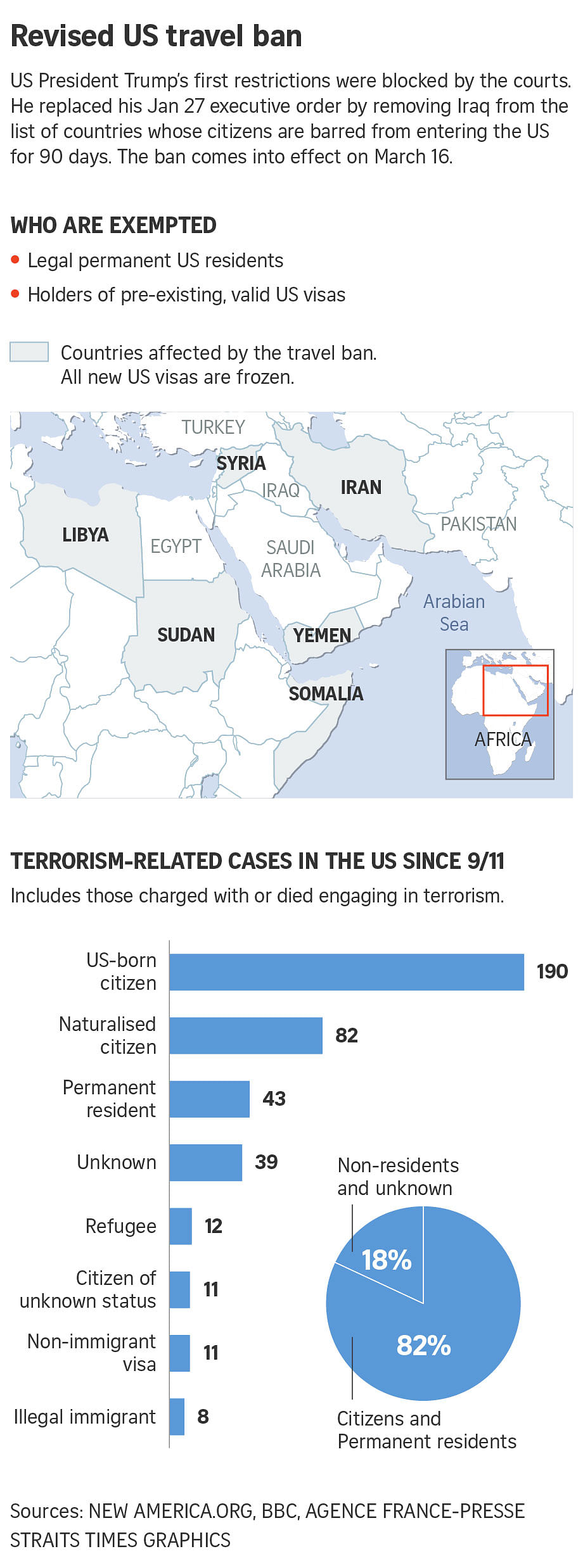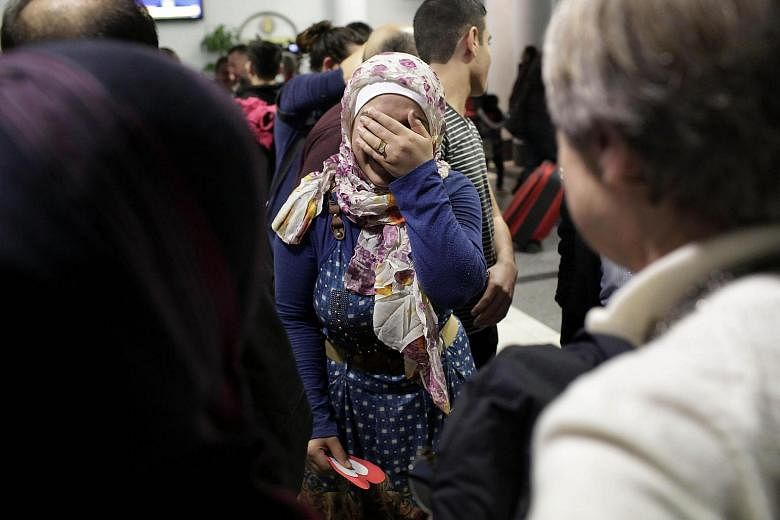WASHINGTON (BLOOMBERG) - President Donald Trump lost the first round of a bitter fight to impose a targeted travel ban. Now comes round two.
After federal courts blocked the president's initial order barring people from seven mostly Muslim nations from entering the US, the administration will now confront fresh legal challenges over a second, somewhat less restrictive ban, legal experts said.
The overarching question is whether the revised order, announced on Monday (March 6), can withstand some of the same legal challenges that doomed the first, including whether it unlawfully discriminates based on religion. Those questions may ultimately be decided by the US Supreme Court, the experts said.
Trump replaced his Jan 27 order by dropping Iraq from the list of countries whose citizens are barred from entering the US for 90 days. While the revised order halts admissions of refugees for 120 days, it no longer bans Syrian refugees indefinitely, nor does it favour Christians.

Permanent legal residents, also known as green card holders, and travellers with a valid visa are excluded.
In issuing the revised order, the administration provided significantly more details, including a question-and-answer document that provides a rationale for the travel ban and guidance for travellers who might be impacted.
But even with the overhaul, advocates for immigrants say Trump's latest attempt to control entry to the country remains a disguised ban on Muslims, despite his statements that he only wants to keep the US safe by vetting people from nations with a history of terrorism.
"It's possible that enough clarification was put in this document that it would now satisfy a judge who was generally deferential to the executive, particularly on matters of relations with other nations, including immigration policy," said Stephen Wasby, a legal scholar at the State University of New York in Albany.
But critics of the original ban said the revised version contained some of the same Constitutional problems.
"The Trump administration has conceded that its original Muslim ban was indefensible," said Omar Jadwat, director of the American Civil Liberties Union's (ACLU) Immigrants' Rights Project. "Unfortunately, it has replaced it with a scaled-back version that shares the same fatal flaws."
New York Attorney General Eric Schneiderman, who like the ACLU sued over the original travel ban, issued a statement on Monday saying he is ready to challenge the new order too because "the intent to discriminate against Muslims remains clear".
Washington Attorney General Bob Ferguson, who also challenged the original ban, said his office was reviewing the order to determine next legal steps.
Like the order it replaced, the revised directive doesn't mention Muslims or Islam in singling out citizens of Iran, Libya, Somalia, Syria, Sudan and Yemen for a 90-day ban. But that didn't stop judges from blocking Trump's first order.
Lawyers challenging the initial order claimed it was intended to target Muslims in violation of the Constitution's Establishment Clause, which forbids the government from favouring one religion over another, and the Equal Protection Clause, which prevents discrimination against people based on their religion.
APPELLATE CONCERNS
The Ninth Circuit Court of Appeals in San Francisco in February didn't decide whether the order discriminated on the basis of religion. Rather, the court disputed the government's claim that it had fulfilled its obligation to justify the ban under another area of the law.
Among other things, it said that Trump's lawyers failed to show that immigrants from the targeted nations ever carried out a terror attack on US soil.
The administration appeared to address the appellate court's concerns in issuing the revised order, providing an explanation why each of the six countries was included and noting that 300 refugees were being investigated for terrorism.
In another case, US District Judge Leonie Brinkema of Virginia went beyond the Ninth Circuit's ruling to consider statements by Trump during his presidential campaign and by former New York Mayor Rudolph Giuliani in concluding that the intent was a Muslim ban.
"A person is not made brand new simply by taking the oath of office," Brinkema said in a Feb 13 opinion. "The 'Muslim ban' was a centrepiece of the president's campaign for months."
Josh Blackman, a professor at the South Texas College of Law in Houston, said the courts would be wrong to elevate comments by Trump and others over official statements in presidential documents, such as the travel ban order.
"There's no precedent for that," Blackman said.
'UNCONTROLLED ENTRY'
Trump didn't mention religion in discussing the travel ban in his Feb 28 address to Congress. Rather, he said it was "reckless to allow uncontrolled entry from places where proper vetting cannot occur".
Those entering "should support this country and love its people and its values. We cannot allow a beachhead of terrorism to form inside America - we cannot allow our nation to become a sanctuary for extremists", the president said.
The first directive created chaotic scenes at airports by revoking visas of about 60,000 people already approved to visit the US for work, study or travel.
The revised order takes effect on March 16, a slower roll-out that is likely to avoid some of the upheaval caused by the first.
By dropping those with green cards and visas, Trump's new order made "significant changes that narrow the scope" of reasons to sue, said Blackman. That change renders moot the legal claims of people with the strongest argument that their Constitutional right to due process of law - the right to a fair hearing before being deprived of property or rights - was being violated.
QUESTIONED MOTIVES
While the US Supreme Court has made clear that non-citizens, legal or not, are entitled to due process when in the country, the Constitution doesn't protect people in other countries with no ties to the US.
Some supporters of Trump's efforts to tighten control of the borders questioned the motives of US judges.
"They're acting politically, not judicially," said Mark Krikorian, executive director of the Centre for Immigration Studies, a Washington-based think tank. "The fight is really about whether judges get to decide who comes into the United States, or elected officials do."
The Trump administration is defending the new order, as it did the old one, by pointing to the president's broad authority to suspend any class of aliens whose entry would be "detrimental to the interests of the United States".
With lawsuits pending around the US over the first travel ban, the Trump administration is arguing that they are no longer relevant.
In a filing on Monday in Seattle federal court, the administration said the new executive order resolves the concerns of Washington state and Minnesota, which challenged the ban.
The US made a similar filing in a Virginia case to head off any request for an emergency ruling blocking the new executive order.
Anil Kalhan, associate law professor at Drexel University in Philadelphia, who specializes in immigration law, says plaintiffs could ask that existing lawsuits be amended to include the revised ban.
"They're not really conflicting policies," he said. "There may be some people who are no longer affected, but they're challenging the same set of underlying facts."

